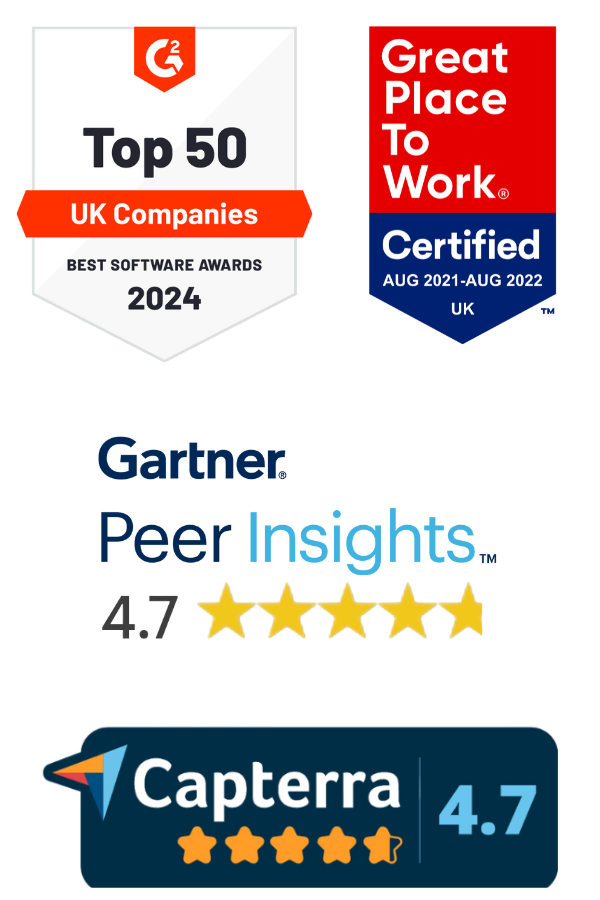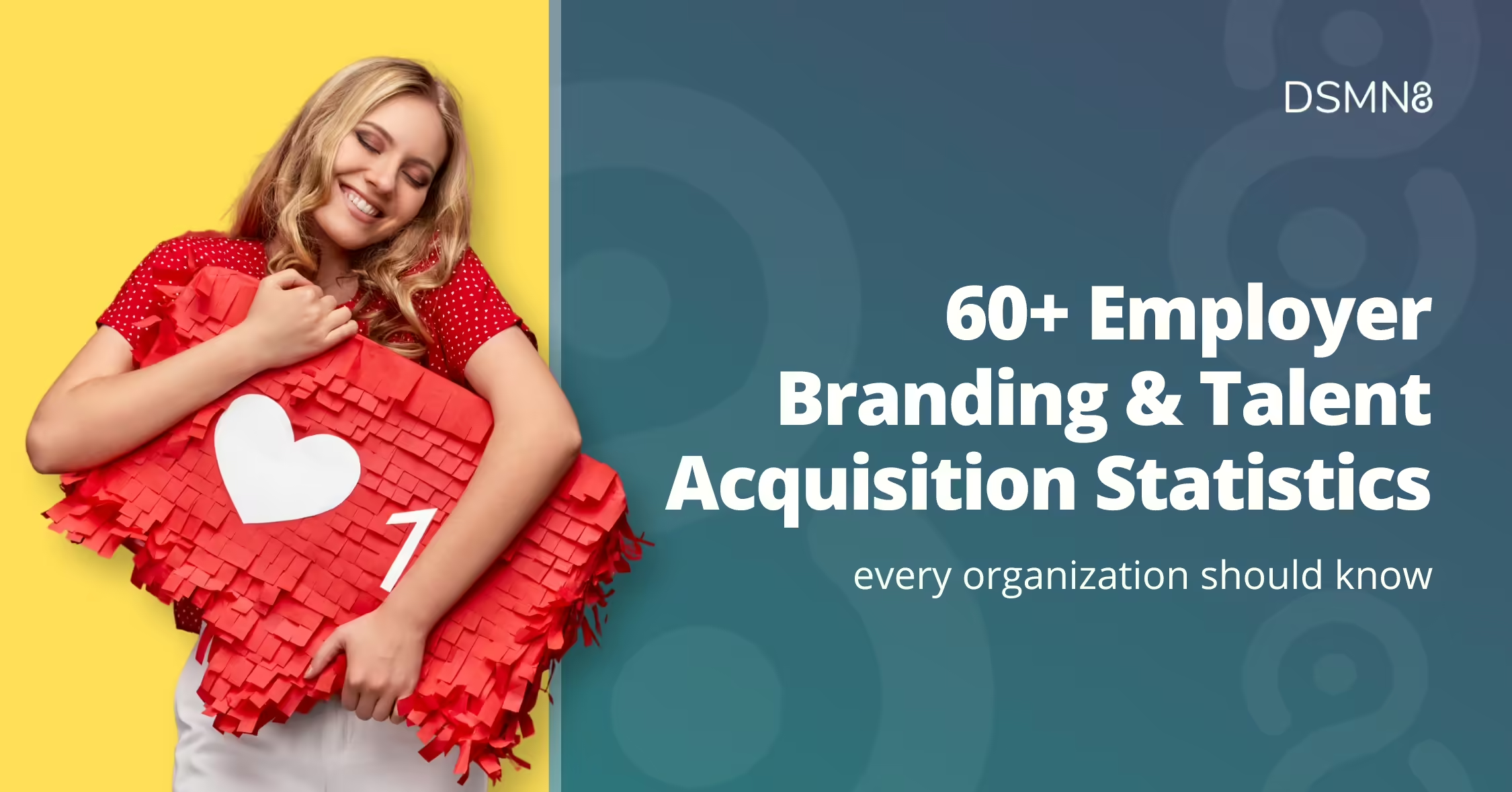
What's on this page:
- What is Employer Branding
- The Impact of Employer Brands on Recruitment
- How Employer Branding Impacts Employee Retention
- How Candidate Experience Affects Employer Brands
- How Leaders Feel About Employer Branding
- How Employers are Developing Their Employer Brands
- Employer Branding ROI Statistics
- Employer Branding Challenges Faced By Employers
- Employer Branding on Social Media Stats
- How Employee Advocacy Impacts Employer Branding
- Key Takeaways
- Additional Resources
In today’s fiercely competitive job market, attracting and retaining top talent has become more challenging than ever.
For companies striving to stand out, a strong employer brand is no longer a luxury—it’s a necessity.
But what exactly makes an employer brand compelling?
How does it impact an organization’s ability to hire the best candidates and create a thriving company culture?
And how are companies leveraging their employer brand in 2024?
To answer these questions, we’ve compiled over 60 essential employer branding statistics that reveal the power of a well-crafted employer brand.
Whether you’re looking to refine your talent acquisition strategy or boost employee engagement, these data-driven insights will equip you with the knowledge to elevate your company’s reputation as an employer of choice.
What is Employer Branding?
Before diving into the stats, let’s briefly define employer branding.
Simply put, employer branding is the process of creating and promoting a company’s reputation as an employer to attract, engage, and retain top talent.
An employer brand strategy involves defining and communicating your organization’s culture, values, and work environment to position it as a good employer to prospective candidates.
Strong employer branding helps differentiate your organization in the competitive job market while enhancing employee satisfaction and retention.
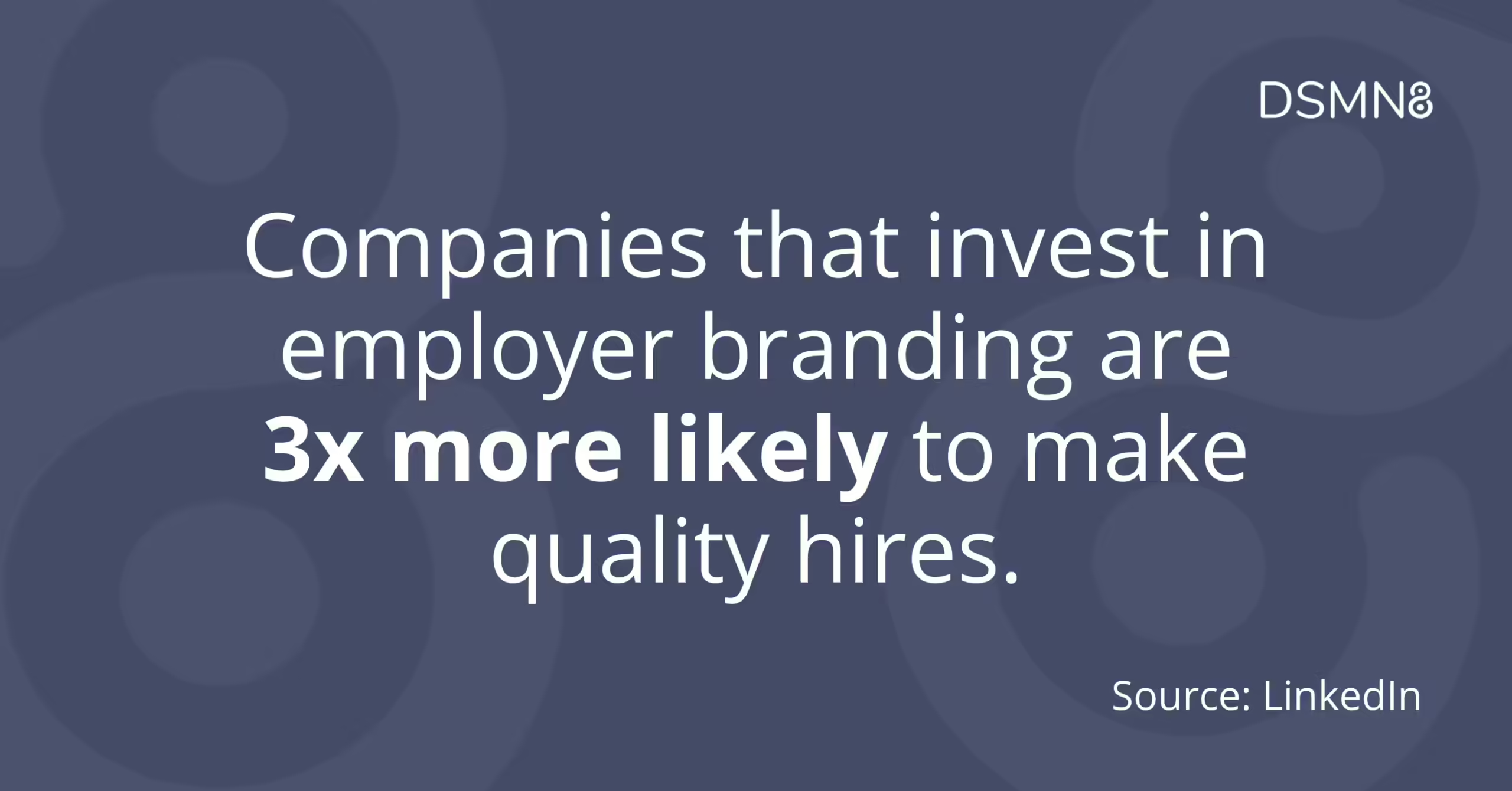
The Impact of Employer Brands on Recruitment
A strong employer brand can significantly enhance your recruitment efforts. Here are the stats to prove how:
- 9/10 of candidates would apply for a job at a company with an active employer brand. (Workable)
- 69% of candidates would reject a job offer from a company with a negative employer brand, even if they were unemployed. (MRINetwork)
- 88% of job seekers consider a company’s employer brand when applying for a job. (LinkedIn)
- Companies that invest in employer branding are 3x more likely to make quality hires. (LinkedIn)
- A positive employer brand can increase a company’s referral rates by 51%. (LinkedIn)
- 76% of candidates want to know about company culture and values before accepting a job offer. (Harvard Business Review)
- Employer branding can reduce time to hire by 50%. (LinkedIn)
- 92% of people would consider changing jobs if offered a role in a company with an excellent reputation. (Forbes)
- 67% of candidates consider company responses to reviews important when evaluating a potential employer. (Glassdoor)
- 60% of recruiters believe that culture fit is the most important factor when making a decision whether to hire or not. (Jobvite)
- A strong employer brand leads to a 50% increase in qualified candidates. (LinkedIn)
Ready to scale your employer branding efforts through the people candidates trust most? Book a Demo with DSMN8, the #1-rated Employee Advocacy Platform.
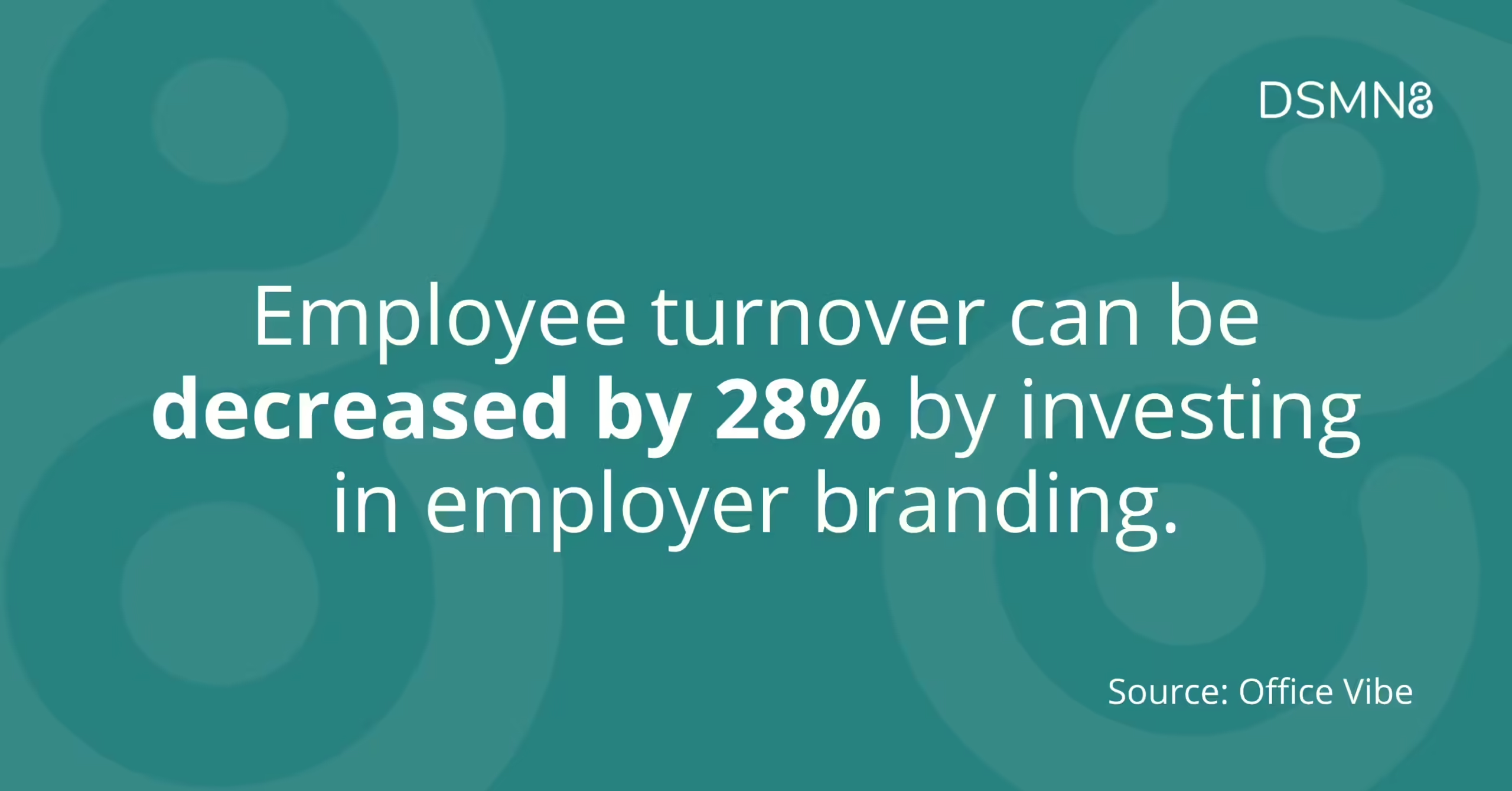
How Employer Branding Impacts Employee Retention
Your employer brand doesn’t just affect recruitment, it also has a significant impact on retaining talent:
- Employee turnover can be decreased by 28% by investing in employer branding. (Office Vibe)
- A 1-star improvement in a company’s Glassdoor rating increases the likelihood that an employee will stay in their next role by 4%. (Glassdoor)
- New employees sourced through LinkedIn are 40% less likely to leave the company within the first 6 months. (LinkedIn)
- Employer branding increases employee engagement by up to 20%. (LinkedIn)
- 82% of employees believe that company culture is a competitive advantage. (Deloitte)
- Senior leadership social media posts engage employees: 37.5% of all interactions came from employees. (DSMN8)
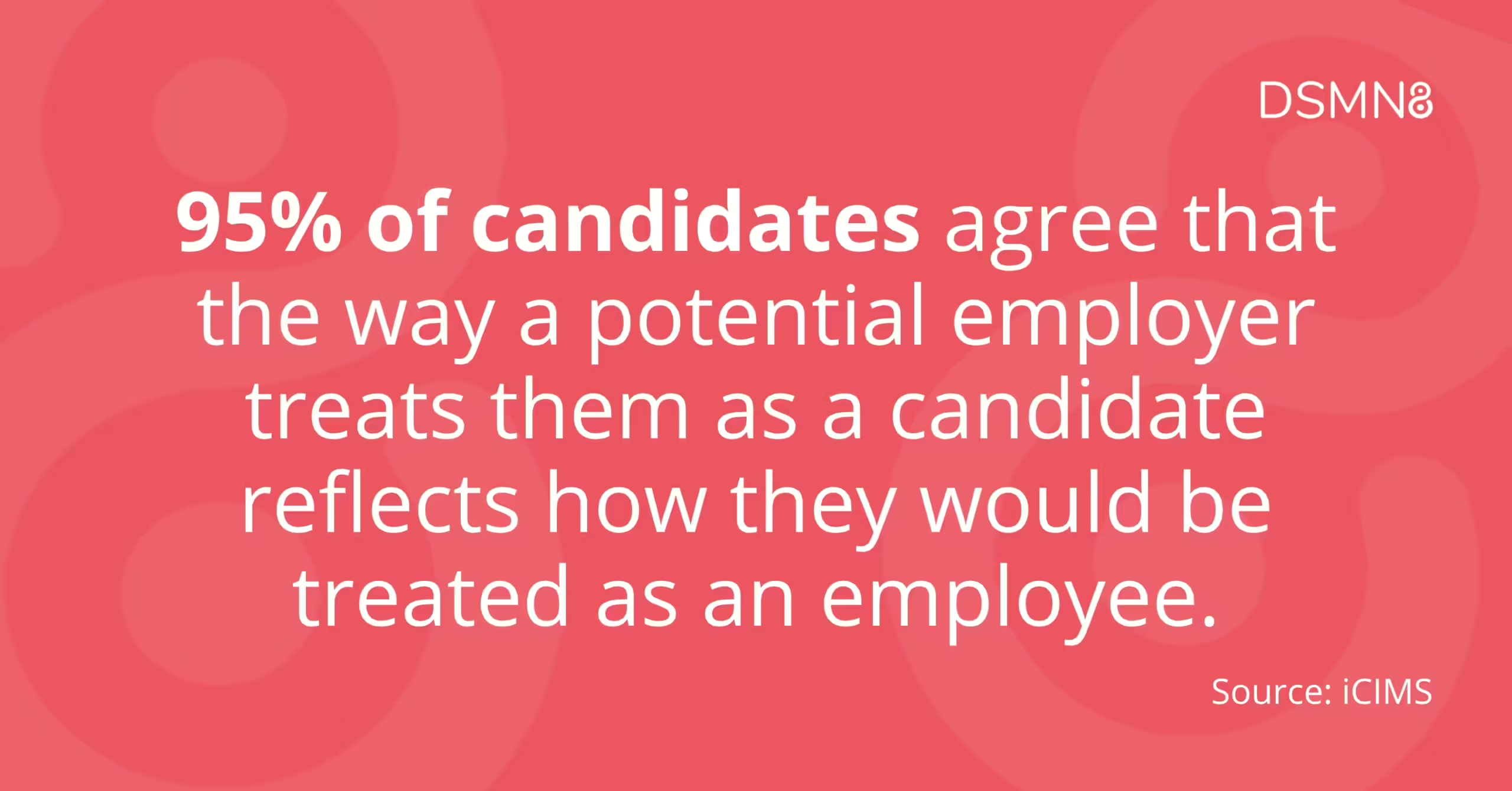
How Candidate Experience Affects Employer Brands
Candidate experience plays a role in how your organization’s culture and employer brand are perceived:
- 95% of candidates agree that the way a potential employer treats them as a candidate reflects how they would be treated as an employee. (iCIMS)
- 72% of candidates are likely to share bad experiences online or with someone directly. (CareerArc)
- 78% of candidates say that their overall candidate experience is an indicator of how a company values employees. (Career Builder)

How Leaders Feel About Employer Branding
Do leaders care about employer branding? In short, yes:
- Employee experience is the second highest concern for US employers, rated as important or very important by 84% of executives. (Deloitte)
- 78% of leading global employers say their employer brand is a top priority in 2023: an increase of 11 points in just two years. (Universum)
- 68% of talent acquisition leaders agree that social media is one of the most effective tools for spreading awareness about their employer brand. (LinkedIn)
- 55% of recruiting leaders have a proactive employer brand strategy. (LinkedIn)
- 89% of HR leaders agree that a strong employer brand gives them a competitive advantage when it comes to attracting talent. (Randstad)
- 72% of recruiting leaders worldwide agree that employer branding has a significant impact on hiring. (TalentLyft)
- 84% of organizations believe a well-maintained employer brand helps them hire quality talent. (Gitnux)
- 80% of talent acquisition managers believe their employer brand has a significant impact on the ability to hire top talent. (Global Recruiting Trends)
- 39% of LinkedIn survey respondents say employer branding will be a long-lasting trend to focus on in the future.
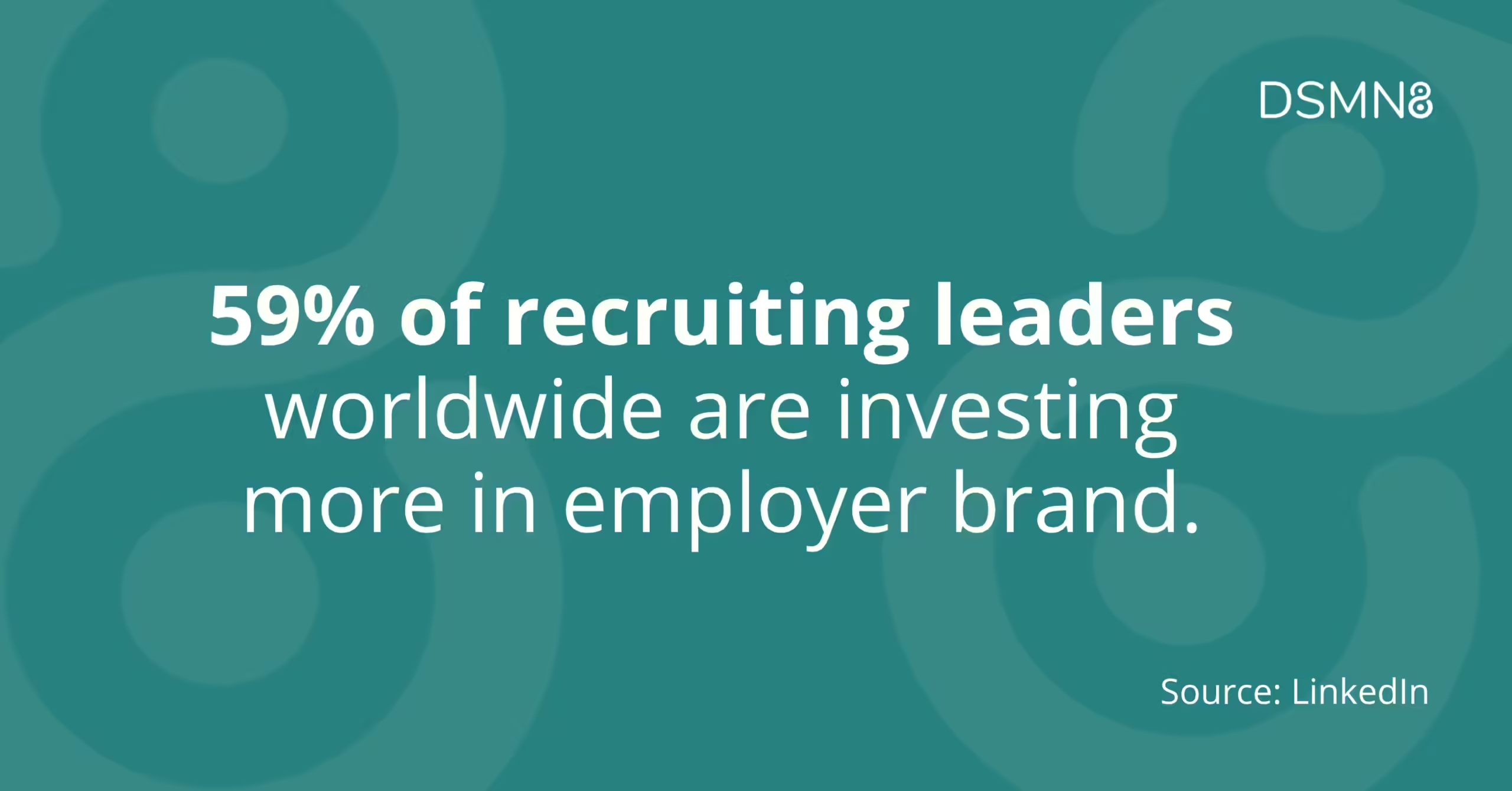
How Employers are Developing Their Employer Brands
Companies are increasing investment in employer branding, with a focus on diversity. They also agree that recruitment is becoming more like marketing:
- The top 3 channels SMBs plan to extend their employer brand: company website (69%), online professional networks (61%), social media (47%). (LinkedIn)
- 75% of CIPD survey respondents reported taking action to improve their employer brand within their organization in the past year. This rose to 84% for enterprise organizations.
- 57% of recruiting pros predict their investment in employer branding will increase in the coming year. (LinkedIn)
- 78% of companies are prioritizing diversity and inclusion to improve their employer brand. (LinkedIn)
- 86% of HR professionals agree that recruitment is becoming more like marketing. (ZipDo)
- 49% of recruiting pros say employer branding will shape recruiting over the next 5 years. (LinkedIn)
- 59% of recruiting leaders worldwide are investing more in employer brand. (LinkedIn)
- 91% of all employers are currently using social media as part of their hiring process (Glassdoor)
How active are your employees on LinkedIn vs your competitors? Find out with a free Competitor Analysis Review.

Employer Branding ROI Statistics
What is the ROI of employer branding, and what impact does a negative employer brand have? The data shows the real cost:
- Organizations with poor employer brands pay 10% higher salaries. (Harvard Business Review)
- Companies with better employer brands see an 11.6% increase in shareholder returns. (ZipDo)
- Companies that actively invest in their employer brand see a 50% decrease in cost-per-hire. (Glassdoor)
- Companies on LinkedIn with a strong Talent Brand Index (TBI) grew 20% faster than those with a weaker talent brand. (LinkedIn)
- Companies with strong talent brands get a 31% higher InMail acceptance rate. (LinkedIn)
According to LinkedIn, the most common ROI metrics used to measure an organization’s employer brand are:
- Retention rate
- Quality of Hire
- Cost of Hire
- # of Applicants

Employer Branding Challenges Faced By Employers
What are the main challenges organizations are facing when it comes to their employer brand? Tools, monitoring the impact, and actioning feedback.
- 49% of employers believe they don’t have the necessary tools to effectively enhance their employer brand. (CareerArc)
- 96% of companies believe their employer brand can positively or negatively impact revenue, but only 44% monitor the impact. (CareerArc)
- Only 12% of respondents surveyed took steps to measure the impact of their employer brand and even fewer monitored or actioned feedback. (CIPD)

Employer Branding on Social Media Stats
In 2024, social media presence plays a significant role in employer branding. Potential candidates will research organizations on social media, and expect the CEO to maintain an active presence.
- 79% of job applicants use social media in their job search (Glassdoor)
- 82% of employees will research a CEO’s online presence when considering whether to join a company. (Brunswick)
- 82% expect leaders to use social media to communicate mission, vision, and values. (Brunswick)
- 68% of Millennials, 54% of Gen-Xers, and 48% of Boomers indicated they visit an employer’s social media profiles specifically to evaluate the employer’s brand. (Glassdoor)
- Over 75% of people who recently changed jobs used LinkedIn to inform their decision. (LinkedIn)
- 52% of candidates first seek out the company’s website and social media profiles to learn more about an employer. (LinkedIn)
- 64% of job seekers would not apply for a role at a company that has no online presence. (CareerArc)
- 48% of job seekers research a company’s culture on social media before applying. (CareerBuilder)
Ready to see how DSMN8 helps scale employee advocacy throughout your company? Book a Demo.

How Employee Advocacy Impacts Employer Branding
Employee advocacy is a strategy that focuses on getting employees active on social media. This supports marketing and sales, but also has a significant impact on employer branding.
Statistics reveal that candidates perceive employees as more credible than the organization, and actively seek out their LinkedIn profiles before applying for a role to gain insight on company culture.
- Posts shared by employees have 800% more engagement than the same posts shared by official brand accounts. (Social Media Today)
- Employee voices are 3x more credible than the CEO’s when talking about working condition in a company. (Edelman Trust Barometer)
- 76% of individuals say that they’re more likely to trust content from individuals over content from brands. (AdWeek)
- 80% of respondents look up social media profiles of current staff when applying for or even considering a position. (Capitalize)
- 86% of employees participating in an employee advocacy program said it positively impacted their careers. (Hinge Research Institute)
- Candidates trust the company’s employees 3x more than the company to provide reliable information on what it’s like to work there. (LinkedIn)
- A CEO generates the same amount of LinkedIn reactions as company pages, despite having 98% fewer followers. (DSMN8)
- Companies with a high number of employees sharing quality content and thought leadership are 58% more likely to attract talent. (LinkedIn)
- Employees who understand and connect with their company’s mission and values are 67% more engaged. (Gallup)
Key Takeaways
The importance of a strong employer brand extends far beyond recruitment: it plays a crucial role in retaining top talent, engaging employees, and even impacts shareholder returns.
Organizations are increasing investment in their employer brand, taking a marketing-driven approach to recruitment and leveraging employee advocacy to showcase their company culture.
In 2024, an active social media presence, especially from leadership, is vital, as candidates increasingly rely on employee insights to make informed decisions. Ultimately, a positive employer brand can dramatically reduce hiring costs and improve overall company reputation.
Additional Resources
Ready to get started with the #1 employee advocacy platform?
Wondering how active your team already is, and how this compares with your competitors?
Emily Neal
SEO and Content Specialist at DSMN8. Emily has 10 years experience blogging, and is a pro at Pinterest Marketing, reaching 1 million monthly views. She’s all about empowering employees to grow their personal brands and become influencers.



